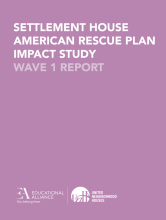
The Educational Alliance, a long standing community partner of NYU's Institute of Human Development and Social Change (IHDSC), collaborated with the United Neighborhood Houses (UNH) and the National Center for Children in Poverty (NCCP) to launch the Settlement House American Rescue Plan (SHARP) Impact Study.
The study investigates family experiences in New York State’s settlement house network to better understand parents’ access and use of the expanded Child Tax Credit (CTC) of the American Rescue Plan Act (ARP) of 2021 and to assess the ongoing unmet needs of families connected to settlement houses. NYU research affiliates worked closely with the project team to develop an advisory board and support the project’s early development. The survey results underscore the extreme financial need of families with young children and the significant challenges they face meeting basic needs including housing, utilities, food, and child care. Among the more than 1,000 families surveyed in this study, the median income was below $24,000 with 37 percent of respondents reporting household income less than $15,000. For context, New York City’s median income is $32,000; the federal poverty threshold for a family of four in 2021 was $26,500.
The survey was developed by a team of researchers to look at four key themes pertaining to family experiences: (1) the administrative burden and accessibility to CTC funds; (2) the use of CTC funds; (3) what needs were met versus remained unmet; and (4) community-based mechanisms for change to enhance positive family outcomes.
Key findings from the SHARP study include:
- Families making under $25,000 annually were significantly less likely than those making over $25,000 to obtain the CTC.
- Most families spent their CTC funds on food, clothing, rent, and utilities.
- Uncertainty around eligibility was disproportionately high among immigrant groups, though most families had heard of the CTC and received payments.
- Financial hardship is associated with psychological distress. Over half (52 percent) of respondents reported some level of anxiety and/or depression; these rates were highest among families experiencing significant financial challenges in the last six months.
- Recipients of CTC payments felt temporarily alleviated from financial hardship. Nearly all (98 percent) families reported that the CTC was somewhat or extremely helpful in meeting their monthly expenses.
One of the primary functions of this report and its findings is to inform anti-poverty policies, interventions, and supports at the city, state, and federal levels. At the federal level, U.S. Congress should prioritize economic legislation that can immediately help families and navigate high costs as a result of rising inflation. No other policy or program can be activated as quickly to address the current economic needs of workers and families as the expansions to the CTC and the Earned Income Tax Credit (EITC) that were included in the American Rescue Plan. A permanent expansion of the federal CTC would be the most efficient and straightforward way to provide this support. Additionally, findings support the recommendation that a child allowance program is automatic, predictable, and untethered to a work requirement. A predictable source of cash support on a monthly basis, rather than a single lump sum at tax time, allows families to budget the additional money into their monthly spending and use it as they best see fit.
At the state level, findings suggest that New York State must expand the Empire State Child Credit by increasing the credit amount available, including families with children under four years old, making it fully refundable for the lowest-income families. In addition, to prevent family homelessness, the state must pass legislation to prevent landlords from evicting tenants without good cause. Lastly, the Educational Alliance and UNH recommend that state lawmakers improve access to affordable child care by working to eliminate barriers to access care, such as means testing and working requirements, as well as expanding nontraditional care hours.
Finally, at the city level, findings from the report demonstrate a need for widespread reform to financial, housing, nutrition, and education programs. These include establishing a wage floor of no less than $21 per hour for all City-contracted human service workers; expanding access to programs like HRA’s Community Food Connection (formerly the Emergency Food Assistance Program); addressing housing affordability and stability by strengthening protections for low- and moderate-income tenants, supporting families with proactive resources, providing free legal counsel and representation in housing court; increasing capacity in the child care sector; and expanding free tax preparation services.

Many of the families surveyed in the SHARP Study have very low incomes, and more than half are immigrants, so we are interested in investigating how these parents learned about, accessed, and used the expanded CTC. Many of our respondents had never earned enough to claim the CTC before this temporary expansion. We are grateful for the continued support of UNH and participation of settlement houses as we begin wave 2 of the study, in which we will learn about whether such families received the second half of the credit in the form of tax refunds earlier this year.
The collaborative research team will continue to work with families to build an understanding of just how policy makers and community based programs can target efforts to benefit children and families for greater economic stability and to reduce the prevalence of child poverty. The next phase of this study will involve in-depth interviews with families residing in the settlement house network for a fuller understanding of the survey results and to capture family and individual perspectives in this area.
Stay up to date on more projects and initiatives from Educational Alliance by visiting the Educational Alliance website.



